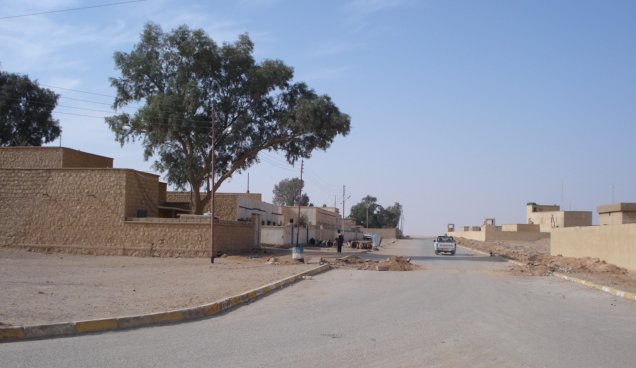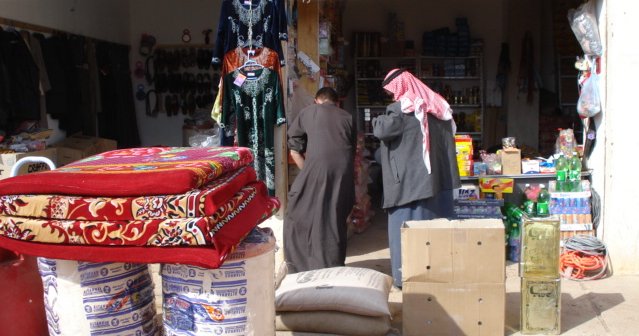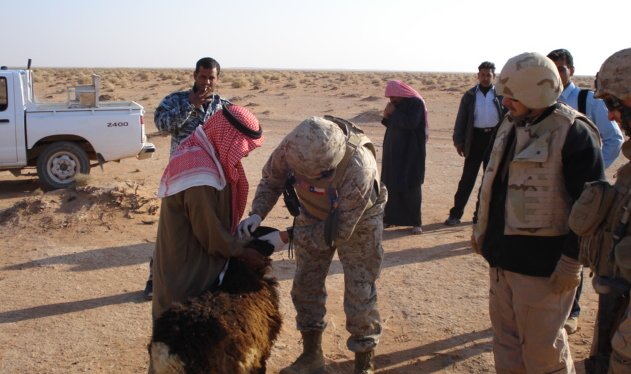I was surprised at the calm in the isolated Nukhayb region. Maybe there just are not enough people to form hostile groups. Sunni and Shiite live together in harmony. They intermarry and even share the same Mosques. Another explanation is good management. The area is guided by Sheik Lawrence, named for the famous T.E. Lawrence of Arabia. (Local pronunciation eliminates the initial “L” sound and his name is usually transliterated as Lorans).
We spoke to Sheik Lawrence at length during a gathering of local leaders at the Nukhayb “Government Center”. The 17 city council members present were all Arab Bedouin men in traditional Arab garb, several of the men are Sheiks of some level.
Lawrence is a man obviously in control, to whom the others clearly deferred. He stands out from his fellows who were dressed in the traditional flowing robes, since he wore a western style blazer and slacks. He also clearly understands English and showed that he understood before the translator spoke. He is well connected in Iraq and internationally. He is kin to the Saudi royal family and has connections all over the Gulf, a member of the provincial council of Anbar and can get appointments with anyone he wants in Baghdad. As a result of all this, Nukhayb gets its share of money from the central authorities.

In our foot patrol through the town, we saw a reasonably well maintained and prosperous place, with smiles and waves from most everyone we encountered. Area children were well clothed, healthy and happy. For a small community in the middle of nowhere, this town doing very well. What were the problems?

In one word: rain, or lack thereof. No rivers run through the region. The six wells in the region supply only drinking water. Agriculture depends almost entirely on rainfall. By this time of the year, the wadis are usually green with new shoots and the shepherds can take their flocks there for food. This year has been bone dry. When the vegetation doesn’t get water to grow, the goats and sheep, which make up the bulk of the local economy, suffer.

I could not get an estimate of the numbers of sheep and goats that I thought was really reliable, but the number of 150,000 came up as consensus figure herded by around 200 nomadic shepherds in a fifty kilometer radius around Nukhayb. Raising sheep and goats is always a precarious business. In the roughly one in five “good” years, there is sufficient grass for the animals. 2003-4 was like that. Other years present varying degrees of hardship. One of the old men in the meeting told us that currently it costs around $150 to raise a sheep until it is ready for sale, but sheep fetch only around $100 on the market. Without access to free range, sheepherding is distinctly unprofitable.
During the bad years, the Iraqi government used to subsidize or provide grain. According to the old men at the meeting, during the time of Saddam Hussein, the government supplied two kilos of grain per head per month. With this guarantee against failure, my guess is that shepherds expanded their herds, which made them ever more dependent on government subsidies and had the additional pernicious effect of overtaxing the carrying capacity of the land. We have a classic tragedy of the commons situation, since the land is not held privately, exacerbated by the moral hazard of government ensuring against failure. Sustainable sheepherding would probably require a significant reduction in the numbers of sheep. This is not the solution the local people embraced, however. They requested that our ePRT either provide the subsided grain or pressure Iraqi authorities to do so.

I am afraid that we have neither the resources nor the inclination to go into the subsidizing of environmental degradation business. We told them that we check into offering some emergency help, which will consist of advice and medical and vitamins, which will help ensure that the sheep that do survive are healthier. The viscous circle of drought, weakness and disease is in play. As the animals get weaker, they are prey to more and varied types of worms and parasites. We can help reduce these maladies.
In the longer run, Sheik Lawrence thought digging wells for irrigation would help mitigate this recurring cycle of crisis. He mentioned that he had seen developed well-based systems in Jordan and Saudi. Ground water in the Nukhayb region is ONLY 220 meters below the surface he claimed. Farther to the west, it is deeper under the surface. He mentioned that they had plans for central pivot irrigation systems, but lacked the experience and expertise to make them work.
Fortunately, our ePRT agricultural expert, has both. Dennis also thinks that some of the local soils could be extremely productive if the proper irrigation techniques were used. We offered to let Dennis help, should it be appropriate. Preliminary steps would be identifying soils that will make irrigation worthwhile and actually digging the wells. Lawrence said that during the time of Saddam Hussein, there was lots of talk about digging wells, but not much action. How have things changed?
